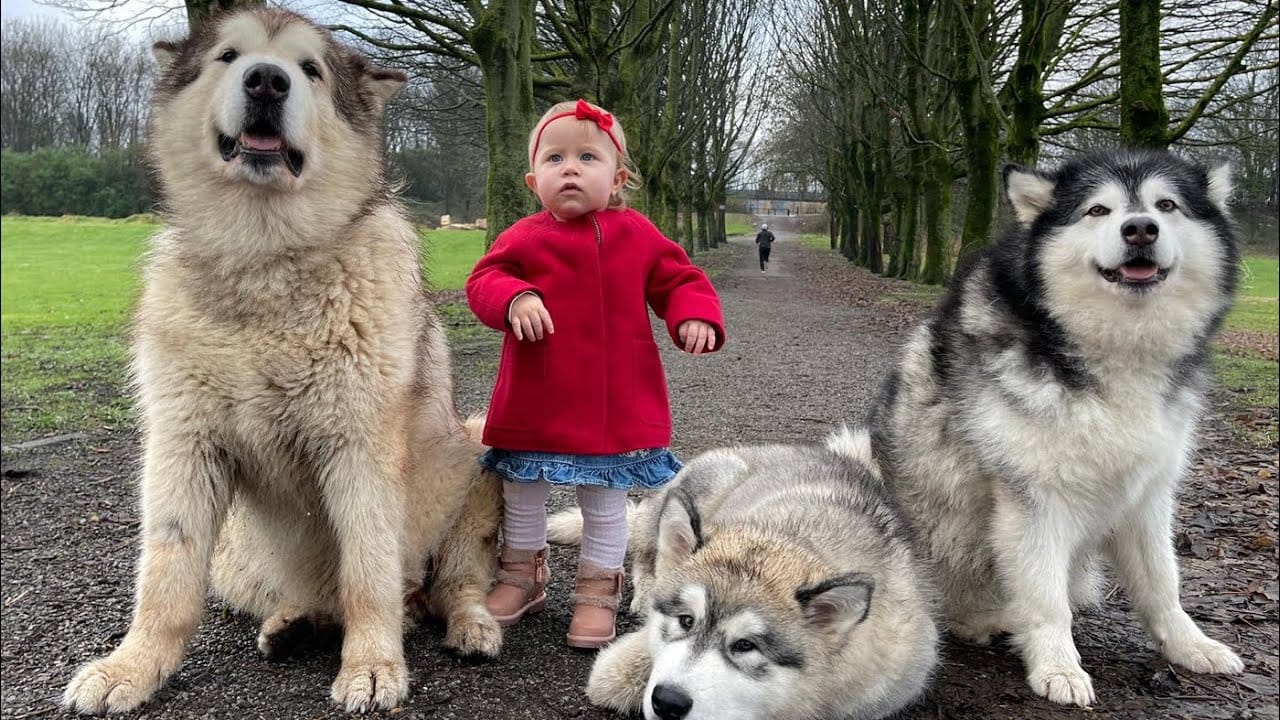Alaskan Malamutes are a popular breed of dog that are known for their strength, loyalty, and intelligence. They were originally bred for sledding and hauling heavy loads in the harsh arctic climate of Alaska. However, they have also gained popularity as family pets due to their gentle nature and affectionate personalities.

Many people wonder if Alaskan Malamutes make good family dogs. The answer is not a simple yes or no, as it depends on a variety of factors. While Alaskan Malamutes are generally friendly and good with children, they are also known for their independent streak and can be stubborn at times. It is important for families to do their research and understand the specific needs and temperament of the breed before deciding if an Alaskan Malamute is the right fit for their family.
Alaskan Malamute Temperament
Family Compatibility
Alaskan Malamutes are known for their loyalty and affection towards their family members. They are friendly and playful, making them great companions for families with children. However, their large size and high energy levels may not be suitable for families with very young children or those who are not able to handle their strength.

Behavior With Children
Alaskan Malamutes are generally good with children and enjoy playing with them. They have a gentle nature and are patient with kids, but they may accidentally knock them over due to their size and exuberance. It is important to supervise interactions between children and Alaskan Malamutes to ensure that they are safe and happy.
Social Interaction With Other Pets
Alaskan Malamutes have a strong prey drive and may not be compatible with smaller pets such as cats or rabbits. They are also known to be territorial and may not get along with other dogs of the same sex. Early socialization and training can help to minimize these issues, but it is important to consider the temperament of any existing pets before bringing an Alaskan Malamute into the household.
In summary, Alaskan Malamutes can make great family pets for those who are able to provide them with adequate exercise, training, and socialization. They are loyal, affectionate, and playful, but may not be suitable for households with very young children or smaller pets.
Physical Characteristics
Size and Strength
Alaskan Malamutes are large and powerful dogs that can weigh between 75 to 100 pounds and stand up to 25 inches tall at the shoulder. They have a sturdy build with a broad chest, strong legs, and a bushy tail. Due to their size and strength, they require regular exercise and a spacious living area.
Coat and Grooming Needs
Alaskan Malamutes have a thick double coat that provides insulation in cold weather. Their coat comes in a variety of colors, including gray, black, and white. They shed heavily twice a year, which requires regular brushing to prevent matting and keep their coat healthy. They also require occasional bathing to keep their coat clean and free from dirt and debris.
In conclusion, Alaskan Malamutes have unique physical characteristics that make them suitable for families who can provide them with proper care and exercise.
Training and Exercise
Training Requirements
Alaskan Malamutes are intelligent dogs, but they can be stubborn and independent. They require consistent and patient training from an early age to establish good behavior and obedience. Positive reinforcement training methods work best with this breed, as they respond well to praise and rewards. Harsh training methods can lead to fear and aggression.
Socialization is also important for Alaskan Malamutes to prevent them from becoming shy or aggressive towards strangers or other animals. Exposing them to different people, animals, and environments will help them become well-adjusted and confident dogs.
Exercise Needs
Alaskan Malamutes are a high-energy breed that requires plenty of exercise to keep them healthy and happy. They were originally bred to pull sleds over long distances, so they need daily exercise that challenges their endurance and strength. A daily walk or jog is not enough for this breed.
Malamutes enjoy activities such as hiking, backpacking, and sledding. They also enjoy playing games like fetch and tug-of-war. Providing them with plenty of outdoor space to run and play is important for their physical and mental wellbeing.
It is important to note that Alaskan Malamutes are not suitable for apartment living or homes without outdoor space. They need a large yard to run and play in, and they thrive in colder climates. Owners should also monitor their exercise in hot weather to prevent heatstroke.
Health and Lifespan
Common Health Issues
Alaskan Malamutes are generally healthy dogs, but like all breeds, they are prone to certain health issues. One of the most common health problems in Alaskan Malamutes is hip dysplasia, a condition that can lead to arthritis and lameness. Other health issues that may affect the breed include:
- Hypothyroidism
- Progressive retinal atrophy
- Bloat
- Epilepsy
To ensure the health of your Alaskan Malamute, it is important to schedule regular check-ups with a veterinarian. Early detection and treatment of any health issues can help prevent more serious problems down the line.
Average Lifespan
The average lifespan of an Alaskan Malamute is around 10-12 years. However, with proper care and nutrition, some Malamutes have been known to live up to 15 years. It is important to provide your Alaskan Malamute with regular exercise and a healthy diet to help ensure a long and happy life.
Overall, while Alaskan Malamutes may be prone to certain health issues, they are generally healthy dogs with a relatively long lifespan. With proper care and attention, they can make great family pets for many years to come.
Living Environment

Space Requirements
Alaskan Malamutes are large dogs that require a considerable amount of space to live comfortably. They are not suitable for apartment living, as they need plenty of room to move around and exercise. A house with a large, fenced yard is ideal for an Alaskan Malamute. This breed is known for its love of digging, so it's important to ensure that the yard is secure and escape-proof.
Climate Adaptability
Alaskan Malamutes are well-suited to cold climates, thanks to their thick, double-layered coats. They are comfortable in temperatures as low as -60°F. However, they may struggle in hot, humid climates, as they are not able to regulate their body temperature as effectively as other breeds. If you live in a warm climate, it's important to provide your Alaskan Malamute with plenty of shade and access to cool, fresh water.
In summary, Alaskan Malamutes require a spacious living environment with a large, secure yard. They are well-suited to cold climates but may struggle in hot, humid conditions. As with any breed, it's important to provide your Alaskan Malamute with the appropriate living conditions to ensure their health and happiness.
Adoption Considerations
Rescue and Adoption
When considering adopting an Alaskan Malamute, it is important to research reputable rescue organizations. These organizations can provide valuable information about the breed and help match families with the right dog. Adopting a Malamute from a rescue organization can also be a more affordable option compared to purchasing from a breeder.
However, it is important to note that Alaskan Malamutes can have behavioral issues due to neglect or mistreatment in their past. It is crucial to work with a reputable rescue organization and a professional dog trainer to address any behavioral issues and ensure a smooth transition into the new home.
Cost of Ownership
Alaskan Malamutes are a large breed and require a significant amount of food and exercise. In addition, they may require regular grooming, which can add to the cost of ownership. It is important to consider these expenses before adopting a Malamute.
It is also important to note that Alaskan Malamutes have a lifespan of 10-12 years on average, which means they will require long-term financial commitment. It is important to budget for routine veterinary care, as well as unexpected medical expenses that may arise.
Overall, adopting an Alaskan Malamute can be a rewarding experience for families who are willing to commit to the breed's unique needs. With proper research, preparation, and training, an Alaskan Malamute can make a wonderful addition to a family.
Facts about Alaskan Malamutes Good Family Dogs

Alaskan Malamutes are known for their unique characteristics that make them good family dogs in the right environment. Here are some facts about Alaskan Malamutes:
- Temperament:
Alaskan Malamutes are generally known for their friendly and affectionate nature. They are loyal and devoted to their families, making them excellent companions. - Good with Children:
Malamutes are often good with children, and their playful and patient nature makes them suitable for families with kids. However, it's important to supervise interactions between dogs and young children to ensure a positive experience for both. - Strong and Sturdy:
These dogs are robust and strong, making them well-suited for active families who enjoy outdoor activities. Their endurance and strength make them great partners for hiking, jogging, or other physical activities. - Social Creatures:
Alaskan Malamutes are social animals that thrive on human companionship. They enjoy being part of family activities and may feel lonely if left alone for extended periods. Regular interaction and socialization are important for their well-being. - Intelligent but Independent:
Malamutes are intelligent dogs, but they can also be independent-minded. Training should start early and be consistent, and positive reinforcement methods are usually more effective. Patience is key when working with this breed. - Grooming Requirements:
Their thick double coat requires regular grooming to prevent matting and reduce shedding. Brushing should be done at least a few times a week to keep their coat in good condition. - Cold Weather Adaptation:
Alaskan Malamutes are bred to withstand cold climates, and they have a thick, insulating coat that helps regulate their body temperature. This makes them more comfortable in colder regions. - Alert and Protective:
While not overly aggressive, Malamutes can be alert and protective, making them good watchdogs. Early socialization helps them differentiate between normal and potential threats. - Energy Levels:
These dogs have high energy levels and require regular exercise to keep them physically and mentally stimulated. Without proper exercise, they may become bored and potentially engage in undesirable behaviors. - Health Considerations:
Like all breeds, Alaskan Malamutes are prone to certain health issues, such as hip dysplasia and eye conditions. Regular veterinary check-ups and a healthy diet are important to maintain their overall well-being.
Remember, individual dogs may vary in temperament, and the environment, training, and socialization play crucial roles in shaping a dog's behavior. It's essential to meet the specific needs of an Alaskan Malamute to ensure a happy and harmonious relationship within a family.

Frequently Asked Questions
- Q1: How do Alaskan Malamutes typically behave around children?
- Alaskan Malamutes are known for their friendly and affectionate nature, making them great family pets. They are patient and gentle with children, but as with any dog breed, supervision is necessary to ensure that both the children and the dog are safe.
- Q2: Can Alaskan Malamutes coexist peacefully with other household pets?
- Alaskan Malamutes have a strong prey drive and may view smaller animals, such as cats or rabbits, as prey. However, with proper socialization and training, they can coexist peacefully with other household pets.
- Q3: What are the training and exercise requirements for an Alaskan Malamute?
- Alaskan Malamutes are highly intelligent and require consistent training and socialization from a young age. They also need a lot of exercise, including daily walks and playtime. Without proper training and exercise, they can become destructive and develop behavioral problems.
- Q4: Is the Alaskan Malamute breed known for being a good guard dog?
- While Alaskan Malamutes are loyal and protective of their family, they are not typically used as guard dogs. They are more likely to greet strangers with wagging tails than to act aggressively towards them.
- Q5: How does the Alaskan Malamute's temperament compare to that of a Husky in a family setting?
- Both Alaskan Malamutes and Huskies are friendly and affectionate with their families. However, Alaskan Malamutes tend to be calmer and more laid-back than Huskies, making them a better choice for families with young children.
- Q6: What potential challenges might families face when owning an Alaskan Malamute?
- Alaskan Malamutes shed heavily and require regular grooming to maintain their thick coat. They also have a tendency to dig and may need a secure yard to prevent them from escaping. Additionally, their high energy level and need for exercise can be a challenge for families who are not prepared to provide them with enough physical activity.




